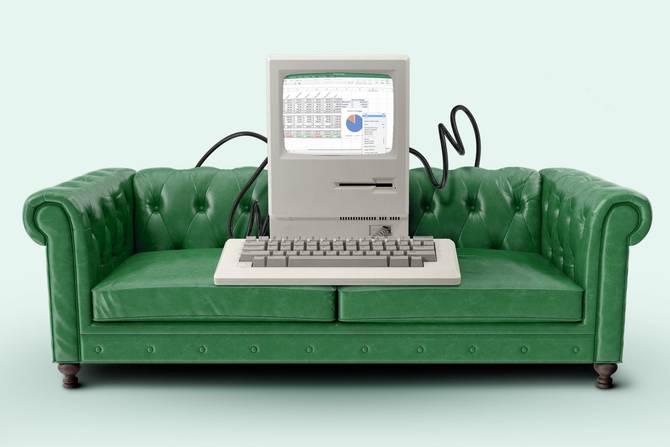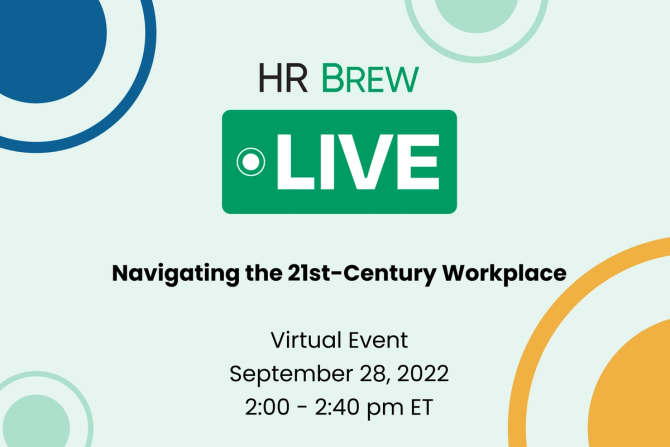Hey, team. Today, the Federal Reserve is expected to announce another interest rate hike that would hopefully lower inflation—and make borrowing money more costly for businesses. So, before dropping cash on extra employee perks, you might want to double check with finance…or just ask for forgiveness later. You do you.
In today’s edition:
 Essential workers Essential workers
 Coworking Coworking
—Susanna Vogel, Kristen Parisi
|
|
Anastasiia_new/Getty Images
In the wake of the Covid-19 pandemic and the summer of racial reckoning, executives heralded HR professionals as essential, strategic changemakers—well, perhaps some more than others.
Indispensable people professionals create employee experience processes, including onboarding and performance management, that reflect and communicate company culture, experts told HR Brew. When HR knocks this out of the park, Brian Kropp, VP of Gartner’s HR research practice, said, HR can be a “differentiator on the labor market” and help attract top talent. Outside consultants might assist in developing people experiences, but Kropp and Art Mazor, global human capital practice leader at Deloitte, agreed that third parties can rarely fully replace internal expertise.
Payroll administration, high-volume recruiting, compensation and benefits management, and other tasks that lend themselves to “high degrees of consistency and scale” are “no-brainers” to outsource, Mazor said. And many companies are choosing to do just that: 49% of full-time HR pros are employed by outsourcing firms or work at shared service centers that may rely on outsourcing, according to Deloitte’s 2021 Global Shared Services and Outsourcing Survey Report.
As the economy teeters toward a possible recession, experts suspect outsourcing HR functions may be attractive to cost-conscious executives. But people professionals who don’t lead employee experience programs aren’t doomed. In a blended HR team, in-house professionals can maintain power and influence by reframing their roles.
Inside the decision to outsource. The global HR outsourcing market is forecast to grow from a $32 billion-dollar industry in 2020 to one worth $45.8 billion by 2027, driven in part by the increased digitization of recruitment processes. Advances in HR tech, Mazor explained, make recruitment processes more repetitive and scalable than ever—music to the ears of C-suite execs making outsourcing decisions. Keep reading here.—SV
Do you work in HR or have information about your HR department we should know? Email [email protected] or DM @SusannaVogel1 on Twitter. For completely confidential conversations, ask Susanna for her number on Signal.
|
|
|
Tough stat incoming: 63% of tech employees quit their jobs in 2021 because of subpar wages.
If tech employers wanna defeat the aftershocks of the Great Resignation and meet the need to fill important roles, competitive pay needs to remain top of mind.
Wondering how the latest salary expectations and realities actually stack up? Get all the figures with Built In’s report, which covers current competitive tech salaries in today’s candidate-driven market.
Peep the salary ranges for 18 in-demand roles—all based on real candidate data—and read up on pay transparency and the shifting environment of tech compensation to ensure your org is aligned with what it takes to attract tech talent and stand out from your competitors.
Get the latest numbers here.
|
|
On Wednesdays, we schedule our weekly 1:1 with HR Brew’s readers. Want to be featured in an upcoming edition? Click here to introduce yourself.
Jana Galbraith is executive general manager of people experience partnering for the Americas at accounting software company Xero. She recently spoke with HR Brew about her role, and how HR technology has transformed in her 24 years in the industry.
How would you describe your specific job to someone who doesn’t work in HR? I do the hiring, the firing, and everything in between. But more broadly, I play a role in creating the best workplace environment possible for all employees. By “environment,” I mean the programs, tools, resources, and cultures that help people do great work [and] help serve the needs of the business. At the end of the day, I create the structural framework so that staff can do the work they enjoy and accomplish objectives in a way that makes them both productive and happy.
What’s the best change you’ve made at a place you’ve worked? Years ago, and in one of the most formative experiences of my HR career, I joined a small e-commerce company that was maturing beyond its startup days. They needed to evolve into an organization that followed relevant legislation, and provided employees with opportunities to grow. I had an opportunity to overhaul the entire company from the inside out, and turn it from a nascent organization with a real imbalance of power among genders to something based on professionalism and that was a culture fit for all different kinds of people. I found out I was pregnant four months into the job there, and helped shape their parental leave policy…We [also] launched a manager development program that had a huge impact.
What’s the biggest misconception people might have about your job? Keep reading here.
Want to be featured in an upcoming edition of Coworking? Click here to introduce yourself.
|
|
TOGETHER WITH EDEN HEALTH
|
|
Fight high costs with high quality. Without reliable, *accessible* preventative care, healthcare costs will continue to rise. The good news? Eden Health offers employee healthcare solutions to help you invest in your team’s well-being—while keeping costs at bay. Get your cost-containment guide here.
|
|
Today’s top HR reads.
Stat: In-office employees in the US spend $863 per month on expenses, including commuting, food, and pet care, while remote workers spend $432 per month. (Owl Labs)
Quote: “Post-pandemic, it’s become so exhaustive in terms of one’s own time, productivity, well-being, etc., because there’s just this constant need to get back to people.”—Vivek Sodera, co-founder of email provider Superhuman, discussing why he thinks workplace messaging tool Slack is a “massive distraction” from completing work (Protocol)
Read: Many senior executive women report experiencing heightened gender bias and discrimination when they reach the middle of their careers, calling “unfair assumptions, unhelpful attention, and unequal access” their biggest challenges. (Harvard Business Review)
The caffeine dream: Wandering Bear customizes commitment-free coffee programs for companies, providing delish, on-tap cold brew so your team always looks forward to their coffee break(s). Get a 100% free tasting for your office.*
*This is sponsored advertising content.
|
|
-
Honda asked hundreds of employees at a factory in Ohio to return part of their bonuses after admitting to overpaying them.
-
Public health experts are torn on whether Covid-19 is nearly in the rearview mirror, but that hasn’t stopped employers from bringing workers back to the office.
-
Office use in several major metropolitan areas returned to pre-pandemic levels last week.
-
Business travel is rebounding, with spending between September and mid-November six times compared to last year.
|
|
|
Ever wonder how big-name companies handle the ever-changing workforce? Join us Sept. 28 at 2pm ET for a virtual event sponsored by Microsoft. We’re sitting down with Otto Krusius, Intuit’s VP of Workforce and Workplace Strategy, to learn how Intuit is navigating these changes. Sign up here.
|
|
Catch up on the top HR Brew stories from the recent past:
|
|
|








